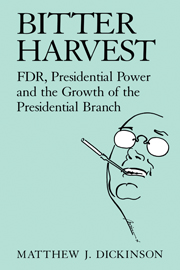Book contents
- Frontmatter
- Contents
- Preface and acknowledgments
- Introduction: The fruits of his labor? FDR and the growth of the presidential branch
- Part I Concepts and controversies
- Part II From cabinet to presidential government, 1933–9
- Part III Testing Roosevelt's staff system: The war years, 1939–45
- Part IV Lessons and considerations
- References
- Indexes
Introduction: The fruits of his labor? FDR and the growth of the presidential branch
Published online by Cambridge University Press: 21 January 2010
- Frontmatter
- Contents
- Preface and acknowledgments
- Introduction: The fruits of his labor? FDR and the growth of the presidential branch
- Part I Concepts and controversies
- Part II From cabinet to presidential government, 1933–9
- Part III Testing Roosevelt's staff system: The war years, 1939–45
- Part IV Lessons and considerations
- References
- Indexes
Summary
In the United States we like to “rate” a president. We measure him as weak or strong and call what we are measuring leadership. … We are quite right to do so.
Richard NeustadtOnly three American presidents – George Washington, Abraham Lincoln, and Franklin Delano Roosevelt – are consistently rated “strong” leaders. Among the post-1933 presidents, FDR stands alone in this regard. Indeed, he largely defined the standards by which his “modern” presidential cohort is judged. Roosevelt's groundbreaking innovations – the use of radio, rhetoric, and the media; the development of legislative programs; the wielding of prerogative powers; and the creation and utilization of a presidential staff system – carved new leadership pathways in the presidential landscape. His successors were, in historian William Leuchtenberg's words, expected to “tread in the rows that he had furrowed.”
In the field of presidential staffing, however, Roosevelt's precedents have been ignored. Here, rather than tread the staffing furrows FDR first marked out, the modern presidents have largely plowed them under. And they have resodded the presidency with soil conducive to the growing of a “presidential branch”: a large, White House–centered presidential staff bureaucracy, its members functionally specialized and hierarchically arranged.
The fruits of that branch have often been bitter. Vietnam, Watergate, and the Iran-contra scandal revealed the dangers of staff mis judgment and outright malfeasance. These incidents, however, are indicative of more deep-rooted problems; as Chapter i argues, there is systematic evidence suggesting that, on balance, the political harvest from increasing White House staff size, hierarchy, and functional specialization has proved harmful to presidents and the body politic.
- Type
- Chapter
- Information
- Bitter HarvestFDR, Presidential Power and the Growth of the Presidential Branch, pp. 1 - 16Publisher: Cambridge University PressPrint publication year: 1996



